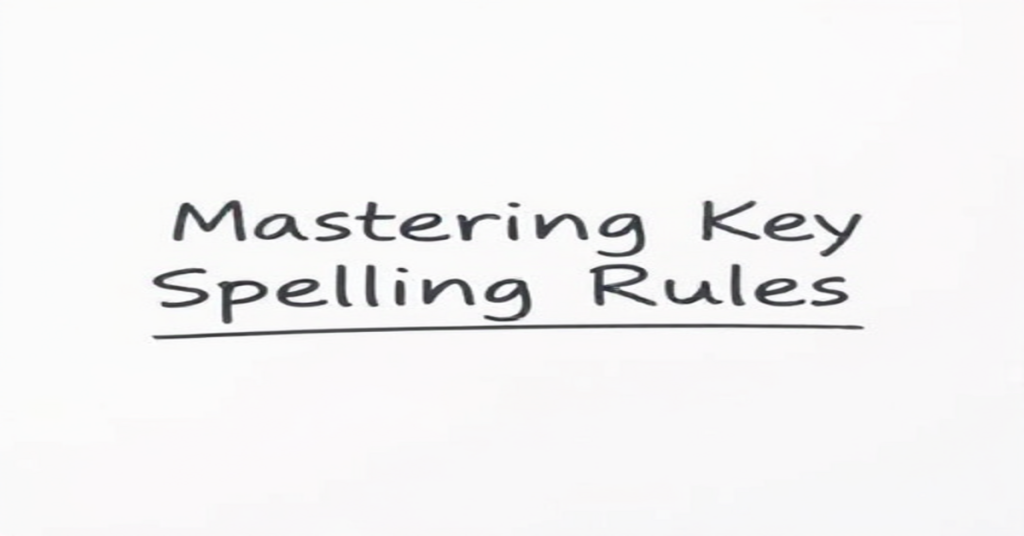Mastering key spelling rules is an important skill for students. Studying Mathematics, Science or English becomes a lot easier if one possesses good language skills. Whether it is 11 Plus exams, GCSEs or mocks, great spelling ability goes a long way. This blog covers essential spelling rules, tips, and techniques. It’s designed to help students succeed, with advice from expert tutors.
Why Are Spelling Rules Important?
Mastering key spelling rules provides a foundation for understanding how words are constructed. For subjects like English, spelling is directly tested, while in Maths and Science, clear spelling ensures proper communication of ideas. Additionally, in exams like the 11 Plus or GCSE verbal reasoning, correct spelling helps students stand out.
Essential Spelling Rules Every Student Should Know
1. The ‘I Before E Except After C’ Rule
Words like “believe,” “receive,” and “ceiling” follow this classic rule. While there are exceptions, this guideline helps with many common words.
2. Silent ‘E’ Rule
When a word ends in a silent “e,” it usually modifies the preceding vowel. For example:
- “Hope” → “Hoping” (drop the ‘e’)
- “Bake” → “Baking”
This rule is crucial when tackling creative writing sections in 11 Plus English or GCSE English essays.
3. Plurals and Changing Endings
- Words ending in “y” (change ‘y’ to ‘i’ and add ‘es’): “party” → “parties”
- Words ending in “f” (change ‘f’ to ‘ves’): “leaf” → “leaves”
These are essential for GCSE English and verbal/non-verbal reasoning sections. For more on preparation for GCSE English, check this blog out: How to Pass GCSE English
4. Doubling the Final Consonant
When a one-syllable word ends in a vowel followed by a consonant, double the consonant before adding “ing” or “ed”:
- “Run” → “Running”
- “Stop” → “Stopped”
This rule also applies to longer words if the final syllable is stressed: “begin” → “beginning.”
Common Spelling Challenges for Students
Spelling can be tricky, especially when it involves irregular words, silent letters, or exceptions to the rules. Here are some common challenges students face and how to overcome them:
1. Irregular Words
Some words don’t follow standard spelling rules, such as “colonel” or “rhythm.” These can only be mastered through regular exposure and practice. Flashcards or apps can help with frequent repetition.
2. Homophones
Words that sound the same but have different meanings and spellings, like “their,” “there,” and “they’re”, are a frequent source of confusion. A tutor can help clarify the meanings and provide memorable examples.
3. Silent Letters
Words like “knight” or “psychology” include silent letters that trip up students. Learning the etymology of these words can sometimes make them easier to understand and spell.
Tips and Techniques for Mastering Key Spelling Rules
1. Use Mnemonics
Mnemonics are powerful memory aids. For instance:
- Because: Big Elephants Can Always Understand Small Elephants
- Necessary: Never Eat Cake, Eat Salad Sandwiches And Raspberry Yogurt
2. Practise with 11 Plus and GCSE Vocabulary Lists
For students preparing for the 11 Plus, focus on commonly tested words in Maths, English, and Science. Similarly, GCSE English includes terms specific to literature, grammar, and comprehension.
3. Break Words into Chunks
For difficult spellings, break words into smaller sections. For example, “environment” can be split into “en-vi-ron-ment.” This approach is especially useful in 11 Plus verbal reasoning.
4. Apply Spelling Games and Apps
Interactive tools like word puzzles or spelling apps make learning fun. Games like Scrabble or Spelling Bee can help students preparing for GCSE mocks or 11 Plus exams.
Spelling and Its Connection to Other Subjects
Good spelling isn’t just about English; it has implications for Maths, Science, and more.
- Maths: Spelling plays a key role in problem-solving when students encounter word problems. Misunderstanding terms like “perimeter” or “radius” can lead to errors.
- Science: In subjects like biology, spelling scientific terms correctly, such as “photosynthesis” or “osmosis”, is essential for clear communication and exam success.
- 11 Plus and GCSE Verbal Reasoning: Spelling accuracy improves comprehension in verbal reasoning sections, helping students perform better overall.
Top Tools to Help Master Spelling
1. Spelling Apps and Software
Applications like Grammarly and Spelling Shed provide real-time feedback and tailored exercises to improve spelling.
2. Practice Tests
Mock tests tailored to 11 Plus and GCSEs not only assess progress but also reinforce the spelling rules students have learned.
3. Spelling Journals
Encourage students to maintain a journal of challenging words. Writing them out repeatedly and using them in sentences can solidify their understanding.
How Tutors Can Help
Working with a tutor ensures personalised support in mastering spelling. Tutors often use practical strategies tailored to the student’s level:
- 11 Plus English and Maths Tutors focus on spelling within vocabulary and word problems.
- GCSE Tutors incorporate subject-specific terms for English, Science, and Maths, helping students prepare for written exams.
How Spelling Impacts Exam Success
For 11 Plus exams, spelling is critical in both verbal and non-verbal reasoning, where precise word understanding is tested. In GCSEs, particularly in Maths and Science, accurate spelling ensures clarity in descriptive questions.
Conclusion
Mastering key spelling rules is a stepping stone to academic success and confidence in everyday communication. These rules not only enhance performance in English, Maths, and Science but also prepare students to excel in exams like the 11 Plus, GCSEs, and mocks.
GX Tuition offers personalised tuition tailored to every aspect of a student’s learning journey. From improving spelling to achieving excellence in GCSE Maths, English, and Science, expert tutors provide the guidance needed to help students achieve their academic goals. Whether preparing for the 11 Plus or focusing on excelling in mocks, students receive the support they need to build confidence and succeed.
Begin the journey with GX Tuition today to unlock full academic potential.


